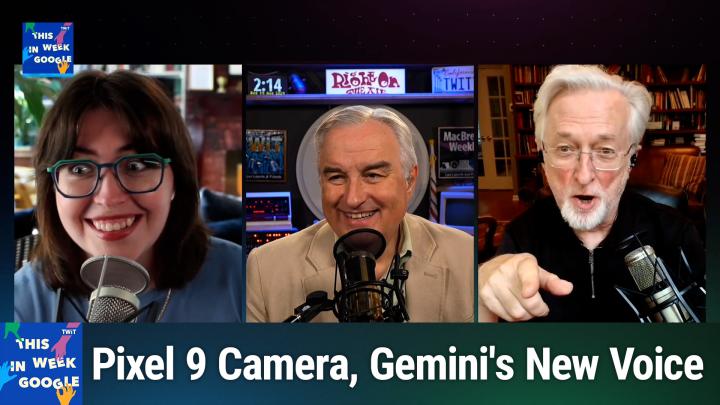Pixel 9's AI-Powered Camera Features: Game-Changer or Controversy?
AI created, human edited.
In a recent episode of This Week in Google (TWiG), hosts Leo Laporte, Paris Martineau, and Jeff Jarvis dove into an in-depth discussion about the newly announced Google Pixel 9 and its cutting-edge camera features. The conversation highlighted both the excitement and concerns surrounding the rapid advancement of AI in smartphone photography.
Leo Laporte kicked off the segment by praising the Pixel 9's practical features, such as the upgraded 5X telephoto lens and improved computational photography capabilities. He noted Google's emphasis on enhancing video capabilities, including HDR video and super-res zoom, which allows for high-quality footage even at great distances.
The hosts were particularly intrigued by the new "Add Me" feature, which allows users to insert themselves into photos they've taken. Jeff Jarvis described a demo where the original image remains frozen while a person can seamlessly add themselves to the picture. This sparked a conversation about the creative possibilities, with Paris Martineau pondering the potential impact on industries reliant on candid celebrity photos.
However, the most controversial aspect of the Pixel 9's camera system was the AI-powered "Magic Editor." This feature allows users to make significant edits to their photos, including generating new elements or expanding the frame using AI. While impressive, the hosts expressed concern about the implications for photo authenticity.
Leo Laporte remarked, "You can't trust any image ever again," highlighting the growing challenge of distinguishing between real and manipulated photos. Paris Martineau speculated on how this technology might affect tabloid journalism and paparazzi culture.
Jeff Jarvis provided historical context, reminding listeners that photo manipulation is not new, citing a famous example of Abraham Lincoln's head being placed on another body. He argued that the concept of photographic "reality" has always been somewhat fluid.
The hosts also touched on other Pixel 9 features, such as improved night sight for panoramas and the ability to enhance zoomed images after they've been taken. They concluded with a lighthearted discussion of the "Made You Look" feature, designed to capture children's attention for photos.
Throughout the conversation, the TWiG team balanced excitement for technological progress with thoughtful consideration of its societal implications. While the Pixel 9's camera capabilities promise to revolutionize smartphone photography, they also raise important questions about the nature of visual truth in our increasingly AI-driven world.
As smartphone cameras continue to evolve, it's clear that the line between photography and digital art is blurring. The Pixel 9 represents a significant step in this direction, offering users unprecedented creative control over their images. However, as our hosts' discussion illustrates, these advancements come with both opportunities and challenges that society will need to grapple with in the years to come.
Subscribe to This Week in Google today!
